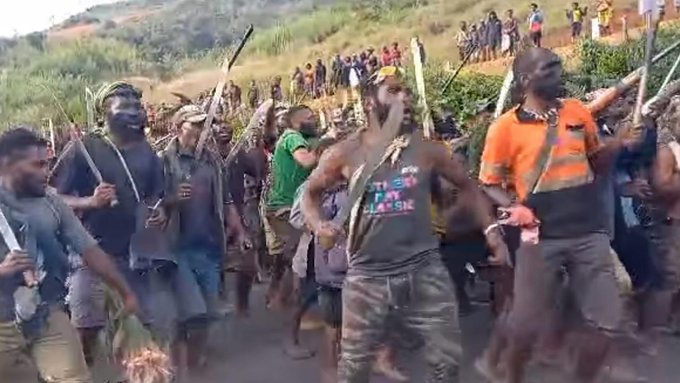Port Moresby: At least 64 men were massacred in a major escalation of tribal violence in Papua New Guinea. Reports from Australian media revealed a grim escalation of tribal violence in Papua New Guinea, with at least 64 men massacred in a tragic incident. Acting Superintendent George Kakas of the Royal Papua New Guinea Constabulary disclosed that the violence erupted when a tribe, accompanied by allies and mercenaries, was en route to attack a neighboring tribe. The ambush took place in Enga province, situated in the remote highlands of the South Pacific nation.
According to Kakas, the ambush resulted in numerous fatalities, with bodies scattered across the countryside and many wounded individuals seeking refuge in the woods. Police efforts to collect the deceased from various locations, including battlefields, roads, and riversides, were underway, with the grim task of counting casualties still ongoing.
Watch Video
The magnitude of the tragedy is unprecedented in the highlands, where infrastructure limitations exacerbate the challenges of law enforcement. Despite the gravity of the situation, authorities in the capital of Port Moresby have yet to provide official confirmation.
Papua New Guinea, known for its cultural diversity and developmental challenges, faces internal security issues exacerbated by political tensions and tribal conflicts. The recent violence underscores the urgent need for effective governance and security measures in the country.
In response to the crisis, Australian Prime Minister Anthony Albanese expressed readiness to support Papua New Guinea, emphasizing the importance of bilateral cooperation between the two neighboring nations. Albanese highlighted Australia’s existing assistance to Papua New Guinea, including efforts to train local law enforcement personnel.
Enga Governor Peter Ipatas lamented the tragic turn of events, emphasizing the devastating impact on both the province and the nation as a whole. Despite prior warnings of impending violence, preventive measures were unable to avert the bloodshed, underscoring the complex nature of tribal conflicts in Papua New Guinea.
As Papua New Guinea grapples with the aftermath of the massacre, international attention underscores the imperative for concerted efforts to address the underlying causes of tribal violence and foster stability in the region.



